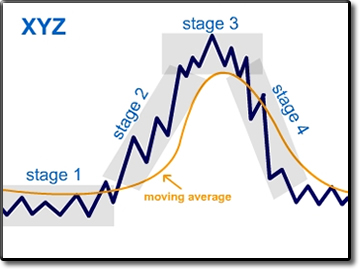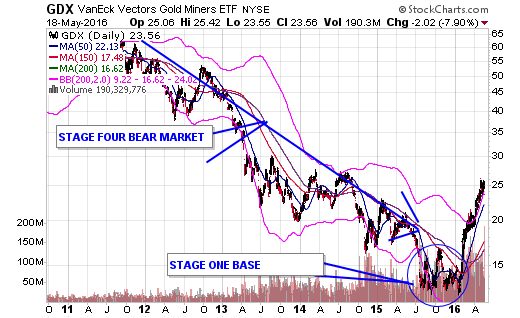Yesterday the stock market and gold prices fell into their closing bells after the release of minutes of the Federal Reserve’s April meeting.
The Federal Reserve did not raise interest rates at that meeting, but the minutes showed that some Federal Reserve Board members hope to raise interest rates in June.
Back in December the Federal Reserve raised interest rates and predicted that it would raise rates four times in 2016.
Then the stock market dumped in January and banks in Europe showed signs of stress so the Federal Reserve got scared and was unable to raise rates at any of its meetings so far this year.
Fed fund futures contracts also pushed out any rate hikes to the Fall.
After the release of yesterday’s minutes though CNBC talking heads began to talk as if the economy were about to boom in the United States in the coming weeks and rates could go up in June or July.
However, the Fed fund futures contracts are still pricing in only a 28% chance of a June interest rate hike.
The thing is though that the media news and quick price drop in gold has scared a lot of people out of gold.
I’m hearing from people in a pure panic over gold.
Some are long and wondering if they should sell and try to buy in at a cheaper price.
Some watched it go up and then bought in at the top and are now on losses feeling like they are getting punched and afraid that the Federal Reserve is going to demolish gold.
The thing is the way your brain works it focuses on short-term daily gyrations in a market and the news of the day.
The media never talks about the big trend in the markets, but only what is happening at the moment and it really hypes up the news item of the day.
In reality the Federal Reserve is not going to raise rates in June for two reasons.
First the stock market rally that began in February has already lost steam.
For the past year we have seen that whenever the S&P 500 approaches the 2000 level or goes below it that the Federal Reserve starts to get cautious about raising interest rates and afraid to even do it.
Secondly there are no signs that some sudden economic boom is coming.
Retail sales have been stagnate this year and we have seen company after company report earnings releases in the last quarter only to see their stock dump.
If you can remember a year ago there were predictions all throughout the year from the CNBC experts and even Federal Reserve officials for rate hikes that never came over and over again. The Federal Reserve people kept saying things like they were “data dependent” and hoping to raise rates next month. Then the economic data wouldn’t get good enough and they would do nothing.
But those news stories kept people obsessed with daily stock market moves so they missed the big picture of a topped out stock market.
And with gold it is the big trend that matters now.
Gold and mining stocks have had a huge rally this year and I believe the rally is only starting and is likely to continue all year long.
But in rallies you get pauses and pullbacks.
The way to make money in the markets is to align your positions with the big trend of the market and not to get worked up over daily gyrations.
There are four stages to a financial market cycle in a stock or entire financial market. As you know you can have a bull market. Before a bull market starts though you usually have a stage one basing phase in which a market simply goes sideways and builds a base.

Then it breaks out and begins a full blown stage two bull market that typically lasts for several years. Then there is a stage three topping phase and then a stage four bear market.
There are various technical indicators you can use to determine when these stages are coming to an end so you can make the proper adjustments. That's a topic a little too big to get into now, but we can look at the basics right now. I can quickly show you one important indicator to watch to identify the trend the market is in.
That's the long-term 150-day moving average, which is simply a line plotted on a chart using the average price number of the past 150-days.
In a bull market this line slopes up on a chart and the price of the market tends to stay above it, so it acts as a nice price support level in a bull market to make for a good entry point timing mechanism.
In a bear market this line slopes down on a chart and the price of the market tends to stay below it and it acts as resistance.
So you can use this moving average to quickly identify the trend of a market. Then you can know if you should be bullish on a market or not.
For example let’s take a look at the GDX ETF, which ones mining stocks. (For disclosure purposes you need to know that I have a position in it).

GDX went through a stage one basing process starting July 2015 and ending this January.
It then surged into a new bull market as it broke through its 150 and 200-day moving averages and resistance highs of the Fall of 2015.
Now it’s 50-day moving average is acting as support.
So if it continues to pullback I’d look for that to act as potential bottoming level.
That’s at $22.13.
Below that support would be in its March trading range, which would put support somewhere above $20.00, but I doubt very much it would fall that much.
No one can predict though short-term tops and bottoms with exact precision.
That makes trying to jump in and out and time things perfectly consistently impossible.
That’s why I am content to hold a core investment position in GDX.
You see most bull markets last 3-5 years.
That means when we look back on things a year from now – heck a few weeks from now – that yesterday’s story that the Federal Reserve could raise rates this June will be completely forgotten about.
Instead everyone will be thinking about how high GDX and gold prices have gone.
At the start of a bull market it is almost all solely professionals and insiders that buy and get invested as small fries and the general public are almost always too slow and too late to the game.
Right now CNBC people never talk about gold starting a bull market.
It takes a market going up for months on end to get enough people to notice to make it worthy of the financial media.
Gold and mining stocks are still only in the first inning of a big brand new bull market and that’s the big trend item that is important to keep in mind if you are interested in getting involved in gold and mining stocks.
In big bull markets you want to hold a core position and buy on dips.
Yesterday’s drop is creating gift for those that want to buy.
For more from Mike Swanson go to www.wallstreetwindow.com.